Organizational Behavior: Culture, Power, Motivation & Team Dynamics
VerifiedAdded on 2023/06/15
|14
|3981
|496
Report
AI Summary
This report provides a comprehensive analysis of organizational behavior within the context of Google UK Ltd., focusing on the impact of organizational culture, politics, and power on individual and team performance. It critically examines different cultural models, such as Handy's cultural model, and power dynamics using the French Raven power model, advocating for the implementation of a task culture and the use of referent and expert power to enhance employee engagement and morale. The report also evaluates content and process theories of motivation, including Maslow's Hierarchy of Needs and goal-setting theory, emphasizing the importance of clear, challenging, and realistic goals, as well as positive feedback and active participation. Furthermore, it discusses team dynamics, differentiating between effective and ineffective teams using Tuckman's stages of team development, and concludes with a personal reflection on the lessons learned about business dynamics, team engagement, and leadership skills, highlighting the importance of cultural sensitivity and equitable power distribution for organizational success. Desklib provides additional resources for students to further explore these concepts.
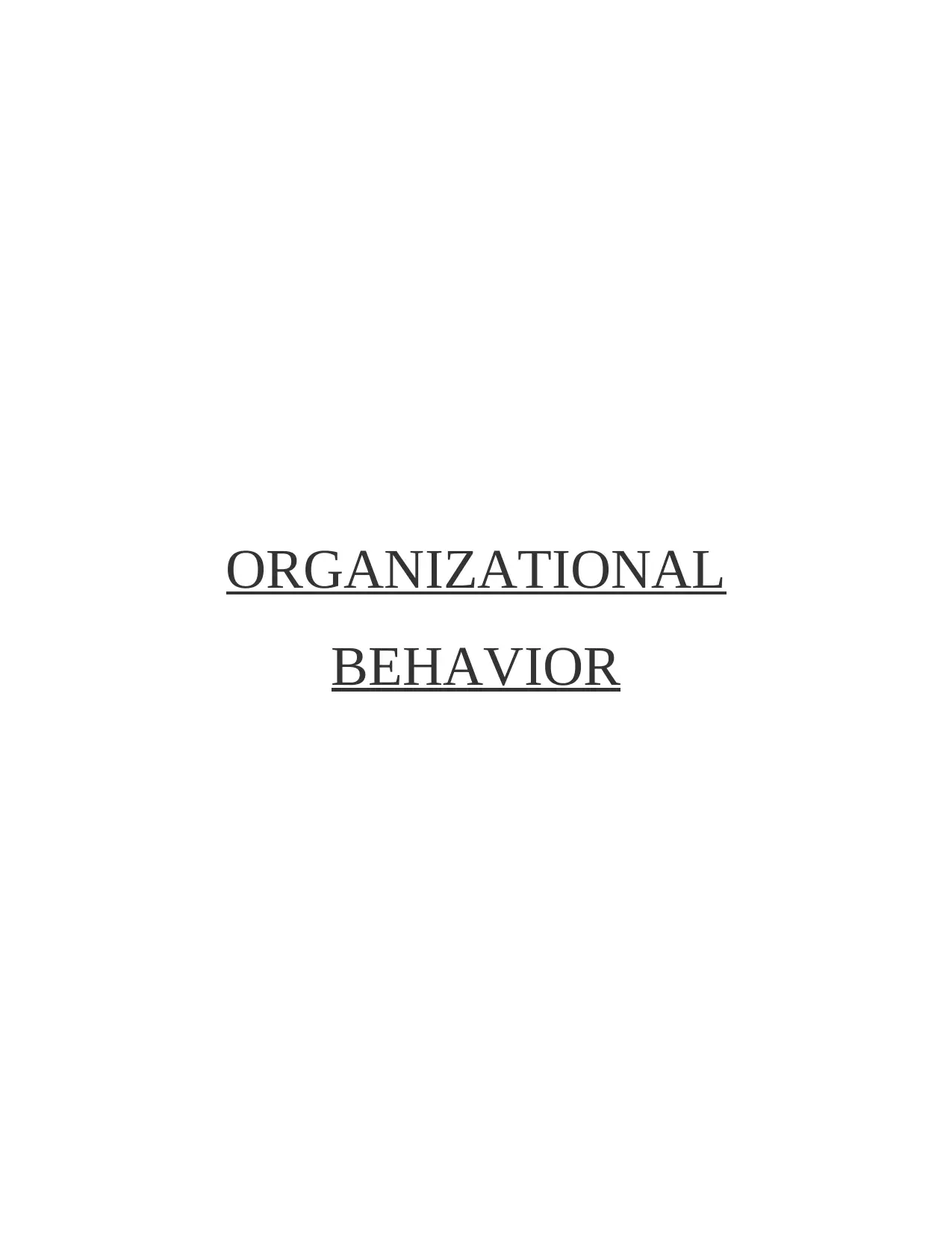
ORGANIZATIONAL
BEHAVIOR
BEHAVIOR
Paraphrase This Document
Need a fresh take? Get an instant paraphrase of this document with our AI Paraphraser
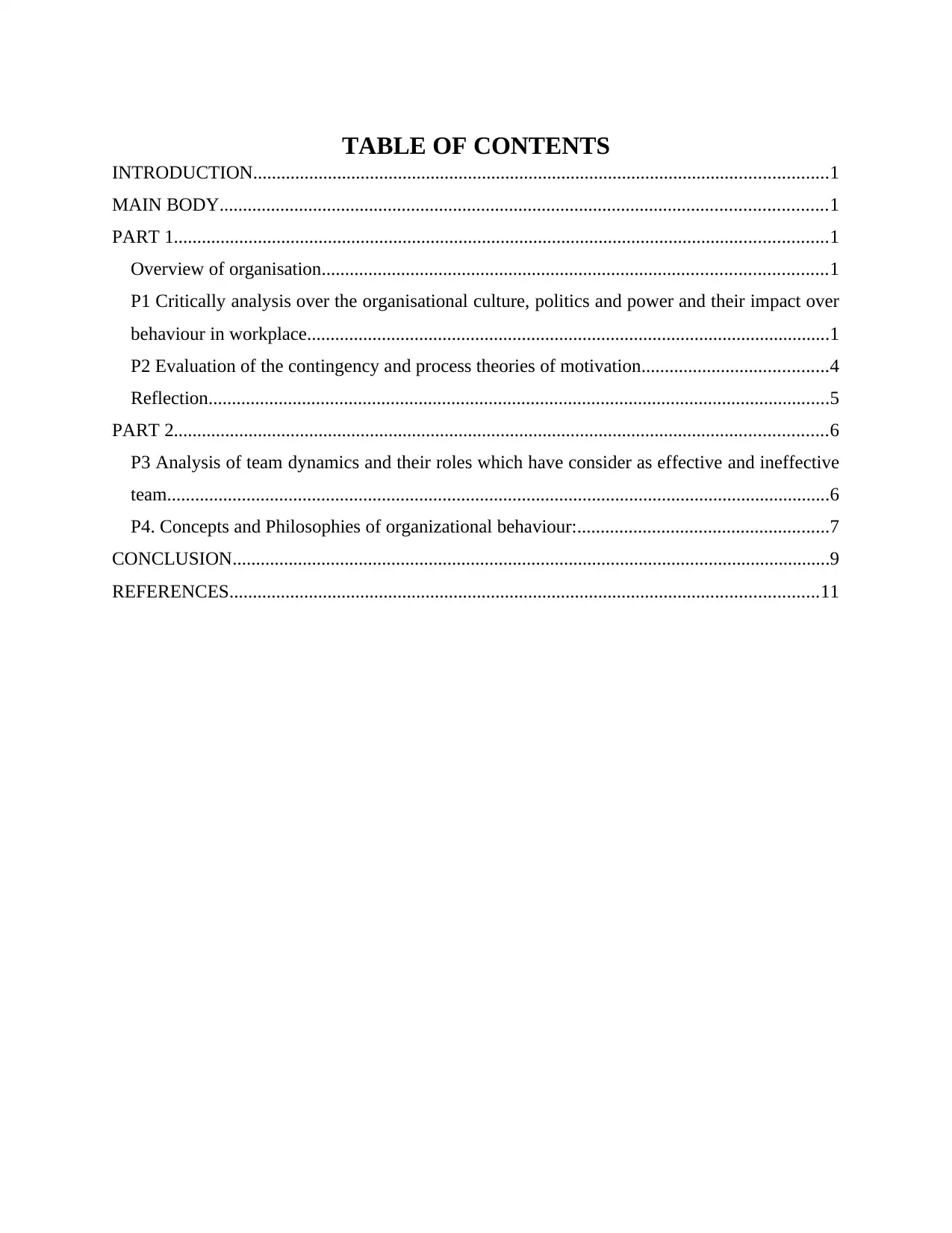
TABLE OF CONTENTS
INTRODUCTION...........................................................................................................................1
MAIN BODY..................................................................................................................................1
PART 1............................................................................................................................................1
Overview of organisation............................................................................................................1
P1 Critically analysis over the organisational culture, politics and power and their impact over
behaviour in workplace................................................................................................................1
P2 Evaluation of the contingency and process theories of motivation........................................4
Reflection.....................................................................................................................................5
PART 2............................................................................................................................................6
P3 Analysis of team dynamics and their roles which have consider as effective and ineffective
team..............................................................................................................................................6
P4. Concepts and Philosophies of organizational behaviour:......................................................7
CONCLUSION................................................................................................................................9
REFERENCES..............................................................................................................................11
INTRODUCTION...........................................................................................................................1
MAIN BODY..................................................................................................................................1
PART 1............................................................................................................................................1
Overview of organisation............................................................................................................1
P1 Critically analysis over the organisational culture, politics and power and their impact over
behaviour in workplace................................................................................................................1
P2 Evaluation of the contingency and process theories of motivation........................................4
Reflection.....................................................................................................................................5
PART 2............................................................................................................................................6
P3 Analysis of team dynamics and their roles which have consider as effective and ineffective
team..............................................................................................................................................6
P4. Concepts and Philosophies of organizational behaviour:......................................................7
CONCLUSION................................................................................................................................9
REFERENCES..............................................................................................................................11
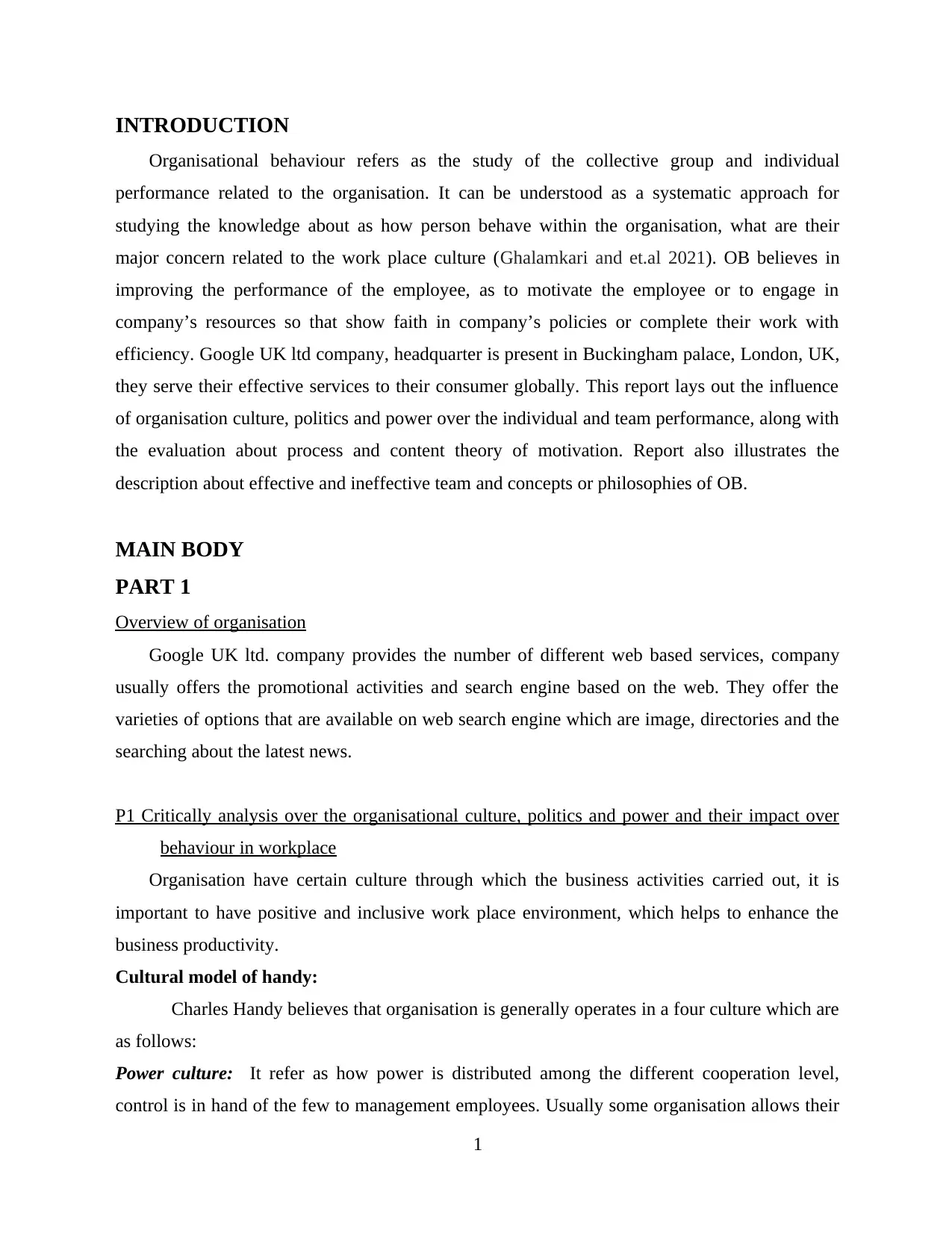
INTRODUCTION
Organisational behaviour refers as the study of the collective group and individual
performance related to the organisation. It can be understood as a systematic approach for
studying the knowledge about as how person behave within the organisation, what are their
major concern related to the work place culture (Ghalamkari and et.al 2021). OB believes in
improving the performance of the employee, as to motivate the employee or to engage in
company’s resources so that show faith in company’s policies or complete their work with
efficiency. Google UK ltd company, headquarter is present in Buckingham palace, London, UK,
they serve their effective services to their consumer globally. This report lays out the influence
of organisation culture, politics and power over the individual and team performance, along with
the evaluation about process and content theory of motivation. Report also illustrates the
description about effective and ineffective team and concepts or philosophies of OB.
MAIN BODY
PART 1
Overview of organisation
Google UK ltd. company provides the number of different web based services, company
usually offers the promotional activities and search engine based on the web. They offer the
varieties of options that are available on web search engine which are image, directories and the
searching about the latest news.
P1 Critically analysis over the organisational culture, politics and power and their impact over
behaviour in workplace
Organisation have certain culture through which the business activities carried out, it is
important to have positive and inclusive work place environment, which helps to enhance the
business productivity.
Cultural model of handy:
Charles Handy believes that organisation is generally operates in a four culture which are
as follows:
Power culture: It refer as how power is distributed among the different cooperation level,
control is in hand of the few to management employees. Usually some organisation allows their
1
Organisational behaviour refers as the study of the collective group and individual
performance related to the organisation. It can be understood as a systematic approach for
studying the knowledge about as how person behave within the organisation, what are their
major concern related to the work place culture (Ghalamkari and et.al 2021). OB believes in
improving the performance of the employee, as to motivate the employee or to engage in
company’s resources so that show faith in company’s policies or complete their work with
efficiency. Google UK ltd company, headquarter is present in Buckingham palace, London, UK,
they serve their effective services to their consumer globally. This report lays out the influence
of organisation culture, politics and power over the individual and team performance, along with
the evaluation about process and content theory of motivation. Report also illustrates the
description about effective and ineffective team and concepts or philosophies of OB.
MAIN BODY
PART 1
Overview of organisation
Google UK ltd. company provides the number of different web based services, company
usually offers the promotional activities and search engine based on the web. They offer the
varieties of options that are available on web search engine which are image, directories and the
searching about the latest news.
P1 Critically analysis over the organisational culture, politics and power and their impact over
behaviour in workplace
Organisation have certain culture through which the business activities carried out, it is
important to have positive and inclusive work place environment, which helps to enhance the
business productivity.
Cultural model of handy:
Charles Handy believes that organisation is generally operates in a four culture which are
as follows:
Power culture: It refer as how power is distributed among the different cooperation level,
control is in hand of the few to management employees. Usually some organisation allows their
1
⊘ This is a preview!⊘
Do you want full access?
Subscribe today to unlock all pages.

Trusted by 1+ million students worldwide
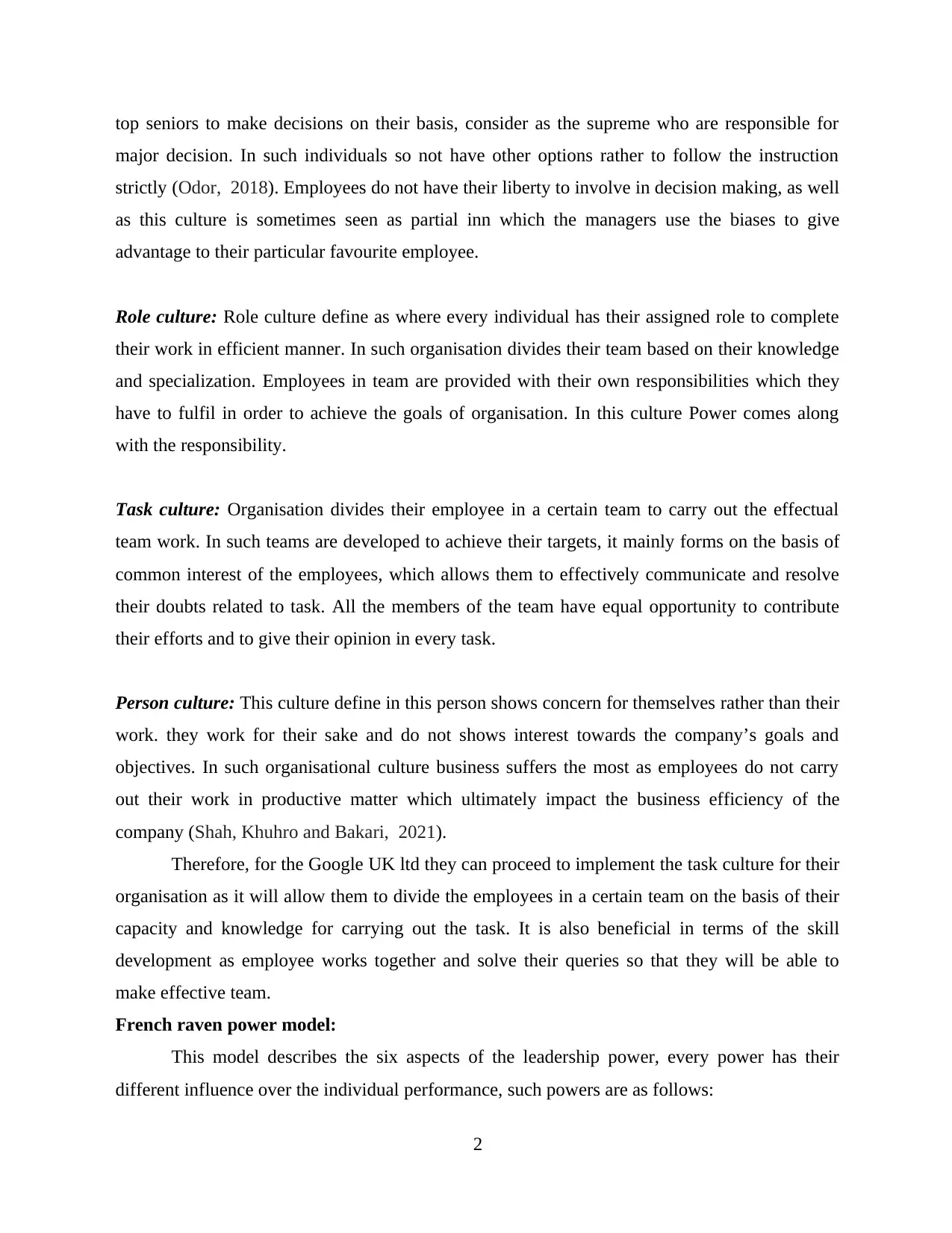
top seniors to make decisions on their basis, consider as the supreme who are responsible for
major decision. In such individuals so not have other options rather to follow the instruction
strictly (Odor, 2018). Employees do not have their liberty to involve in decision making, as well
as this culture is sometimes seen as partial inn which the managers use the biases to give
advantage to their particular favourite employee.
Role culture: Role culture define as where every individual has their assigned role to complete
their work in efficient manner. In such organisation divides their team based on their knowledge
and specialization. Employees in team are provided with their own responsibilities which they
have to fulfil in order to achieve the goals of organisation. In this culture Power comes along
with the responsibility.
Task culture: Organisation divides their employee in a certain team to carry out the effectual
team work. In such teams are developed to achieve their targets, it mainly forms on the basis of
common interest of the employees, which allows them to effectively communicate and resolve
their doubts related to task. All the members of the team have equal opportunity to contribute
their efforts and to give their opinion in every task.
Person culture: This culture define in this person shows concern for themselves rather than their
work. they work for their sake and do not shows interest towards the company’s goals and
objectives. In such organisational culture business suffers the most as employees do not carry
out their work in productive matter which ultimately impact the business efficiency of the
company (Shah, Khuhro and Bakari, 2021).
Therefore, for the Google UK ltd they can proceed to implement the task culture for their
organisation as it will allow them to divide the employees in a certain team on the basis of their
capacity and knowledge for carrying out the task. It is also beneficial in terms of the skill
development as employee works together and solve their queries so that they will be able to
make effective team.
French raven power model:
This model describes the six aspects of the leadership power, every power has their
different influence over the individual performance, such powers are as follows:
2
major decision. In such individuals so not have other options rather to follow the instruction
strictly (Odor, 2018). Employees do not have their liberty to involve in decision making, as well
as this culture is sometimes seen as partial inn which the managers use the biases to give
advantage to their particular favourite employee.
Role culture: Role culture define as where every individual has their assigned role to complete
their work in efficient manner. In such organisation divides their team based on their knowledge
and specialization. Employees in team are provided with their own responsibilities which they
have to fulfil in order to achieve the goals of organisation. In this culture Power comes along
with the responsibility.
Task culture: Organisation divides their employee in a certain team to carry out the effectual
team work. In such teams are developed to achieve their targets, it mainly forms on the basis of
common interest of the employees, which allows them to effectively communicate and resolve
their doubts related to task. All the members of the team have equal opportunity to contribute
their efforts and to give their opinion in every task.
Person culture: This culture define in this person shows concern for themselves rather than their
work. they work for their sake and do not shows interest towards the company’s goals and
objectives. In such organisational culture business suffers the most as employees do not carry
out their work in productive matter which ultimately impact the business efficiency of the
company (Shah, Khuhro and Bakari, 2021).
Therefore, for the Google UK ltd they can proceed to implement the task culture for their
organisation as it will allow them to divide the employees in a certain team on the basis of their
capacity and knowledge for carrying out the task. It is also beneficial in terms of the skill
development as employee works together and solve their queries so that they will be able to
make effective team.
French raven power model:
This model describes the six aspects of the leadership power, every power has their
different influence over the individual performance, such powers are as follows:
2
Paraphrase This Document
Need a fresh take? Get an instant paraphrase of this document with our AI Paraphraser
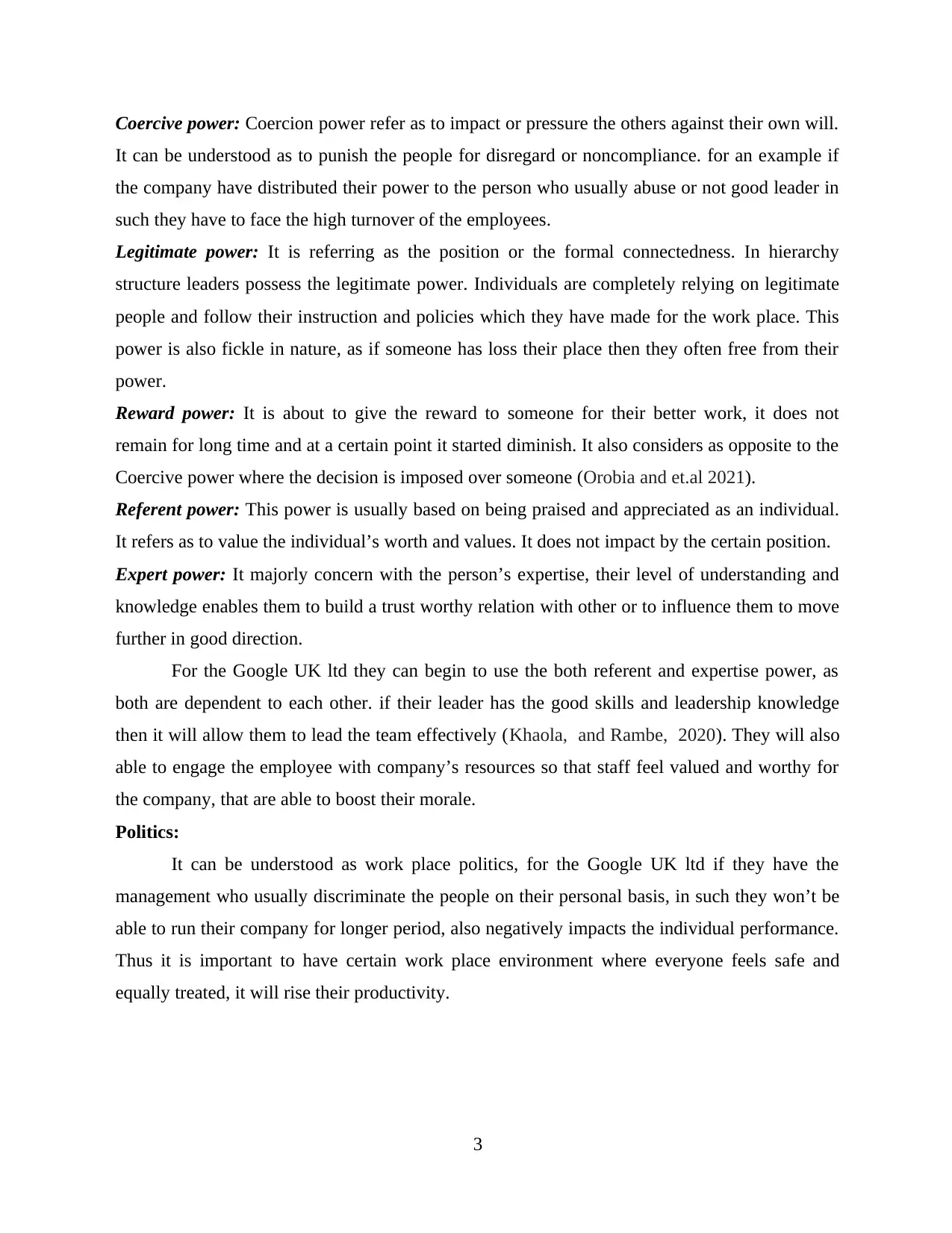
Coercive power: Coercion power refer as to impact or pressure the others against their own will.
It can be understood as to punish the people for disregard or noncompliance. for an example if
the company have distributed their power to the person who usually abuse or not good leader in
such they have to face the high turnover of the employees.
Legitimate power: It is referring as the position or the formal connectedness. In hierarchy
structure leaders possess the legitimate power. Individuals are completely relying on legitimate
people and follow their instruction and policies which they have made for the work place. This
power is also fickle in nature, as if someone has loss their place then they often free from their
power.
Reward power: It is about to give the reward to someone for their better work, it does not
remain for long time and at a certain point it started diminish. It also considers as opposite to the
Coercive power where the decision is imposed over someone (Orobia and et.al 2021).
Referent power: This power is usually based on being praised and appreciated as an individual.
It refers as to value the individual’s worth and values. It does not impact by the certain position.
Expert power: It majorly concern with the person’s expertise, their level of understanding and
knowledge enables them to build a trust worthy relation with other or to influence them to move
further in good direction.
For the Google UK ltd they can begin to use the both referent and expertise power, as
both are dependent to each other. if their leader has the good skills and leadership knowledge
then it will allow them to lead the team effectively (Khaola, and Rambe, 2020). They will also
able to engage the employee with company’s resources so that staff feel valued and worthy for
the company, that are able to boost their morale.
Politics:
It can be understood as work place politics, for the Google UK ltd if they have the
management who usually discriminate the people on their personal basis, in such they won’t be
able to run their company for longer period, also negatively impacts the individual performance.
Thus it is important to have certain work place environment where everyone feels safe and
equally treated, it will rise their productivity.
3
It can be understood as to punish the people for disregard or noncompliance. for an example if
the company have distributed their power to the person who usually abuse or not good leader in
such they have to face the high turnover of the employees.
Legitimate power: It is referring as the position or the formal connectedness. In hierarchy
structure leaders possess the legitimate power. Individuals are completely relying on legitimate
people and follow their instruction and policies which they have made for the work place. This
power is also fickle in nature, as if someone has loss their place then they often free from their
power.
Reward power: It is about to give the reward to someone for their better work, it does not
remain for long time and at a certain point it started diminish. It also considers as opposite to the
Coercive power where the decision is imposed over someone (Orobia and et.al 2021).
Referent power: This power is usually based on being praised and appreciated as an individual.
It refers as to value the individual’s worth and values. It does not impact by the certain position.
Expert power: It majorly concern with the person’s expertise, their level of understanding and
knowledge enables them to build a trust worthy relation with other or to influence them to move
further in good direction.
For the Google UK ltd they can begin to use the both referent and expertise power, as
both are dependent to each other. if their leader has the good skills and leadership knowledge
then it will allow them to lead the team effectively (Khaola, and Rambe, 2020). They will also
able to engage the employee with company’s resources so that staff feel valued and worthy for
the company, that are able to boost their morale.
Politics:
It can be understood as work place politics, for the Google UK ltd if they have the
management who usually discriminate the people on their personal basis, in such they won’t be
able to run their company for longer period, also negatively impacts the individual performance.
Thus it is important to have certain work place environment where everyone feels safe and
equally treated, it will rise their productivity.
3
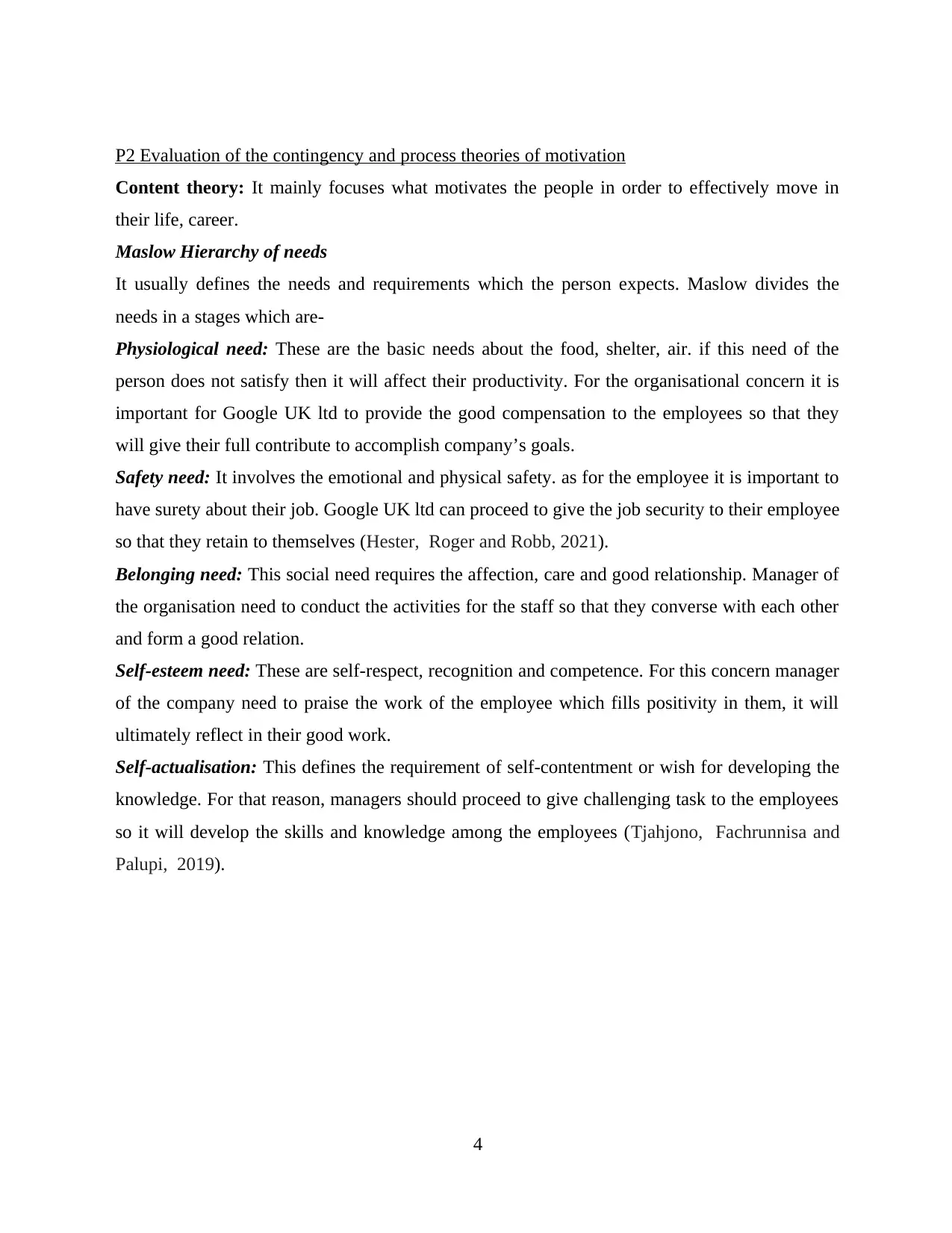
P2 Evaluation of the contingency and process theories of motivation
Content theory: It mainly focuses what motivates the people in order to effectively move in
their life, career.
Maslow Hierarchy of needs
It usually defines the needs and requirements which the person expects. Maslow divides the
needs in a stages which are-
Physiological need: These are the basic needs about the food, shelter, air. if this need of the
person does not satisfy then it will affect their productivity. For the organisational concern it is
important for Google UK ltd to provide the good compensation to the employees so that they
will give their full contribute to accomplish company’s goals.
Safety need: It involves the emotional and physical safety. as for the employee it is important to
have surety about their job. Google UK ltd can proceed to give the job security to their employee
so that they retain to themselves (Hester, Roger and Robb, 2021).
Belonging need: This social need requires the affection, care and good relationship. Manager of
the organisation need to conduct the activities for the staff so that they converse with each other
and form a good relation.
Self-esteem need: These are self-respect, recognition and competence. For this concern manager
of the company need to praise the work of the employee which fills positivity in them, it will
ultimately reflect in their good work.
Self-actualisation: This defines the requirement of self-contentment or wish for developing the
knowledge. For that reason, managers should proceed to give challenging task to the employees
so it will develop the skills and knowledge among the employees (Tjahjono, Fachrunnisa and
Palupi, 2019).
4
Content theory: It mainly focuses what motivates the people in order to effectively move in
their life, career.
Maslow Hierarchy of needs
It usually defines the needs and requirements which the person expects. Maslow divides the
needs in a stages which are-
Physiological need: These are the basic needs about the food, shelter, air. if this need of the
person does not satisfy then it will affect their productivity. For the organisational concern it is
important for Google UK ltd to provide the good compensation to the employees so that they
will give their full contribute to accomplish company’s goals.
Safety need: It involves the emotional and physical safety. as for the employee it is important to
have surety about their job. Google UK ltd can proceed to give the job security to their employee
so that they retain to themselves (Hester, Roger and Robb, 2021).
Belonging need: This social need requires the affection, care and good relationship. Manager of
the organisation need to conduct the activities for the staff so that they converse with each other
and form a good relation.
Self-esteem need: These are self-respect, recognition and competence. For this concern manager
of the company need to praise the work of the employee which fills positivity in them, it will
ultimately reflect in their good work.
Self-actualisation: This defines the requirement of self-contentment or wish for developing the
knowledge. For that reason, managers should proceed to give challenging task to the employees
so it will develop the skills and knowledge among the employees (Tjahjono, Fachrunnisa and
Palupi, 2019).
4
⊘ This is a preview!⊘
Do you want full access?
Subscribe today to unlock all pages.

Trusted by 1+ million students worldwide
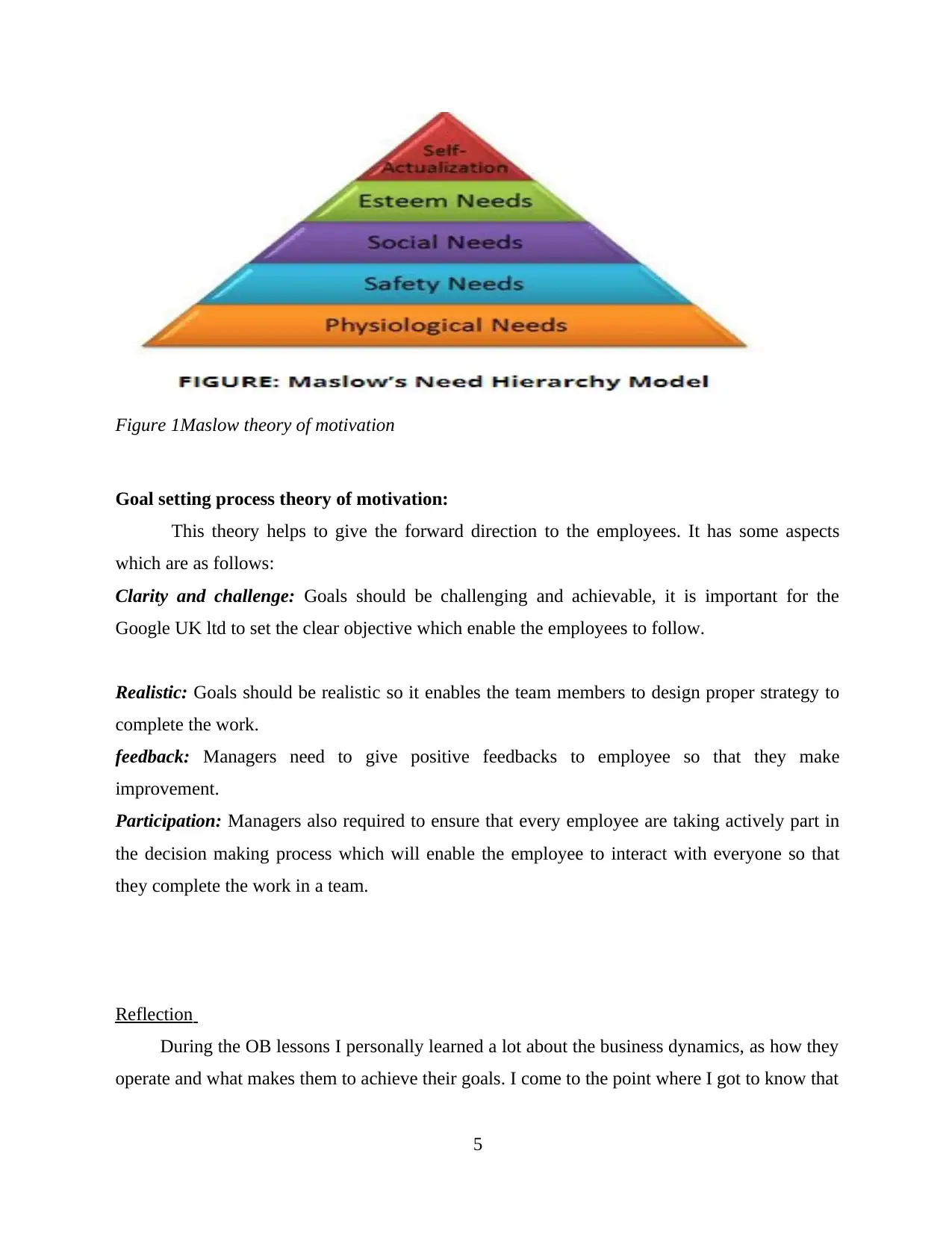
Figure 1Maslow theory of motivation
Goal setting process theory of motivation:
This theory helps to give the forward direction to the employees. It has some aspects
which are as follows:
Clarity and challenge: Goals should be challenging and achievable, it is important for the
Google UK ltd to set the clear objective which enable the employees to follow.
Realistic: Goals should be realistic so it enables the team members to design proper strategy to
complete the work.
feedback: Managers need to give positive feedbacks to employee so that they make
improvement.
Participation: Managers also required to ensure that every employee are taking actively part in
the decision making process which will enable the employee to interact with everyone so that
they complete the work in a team.
Reflection
During the OB lessons I personally learned a lot about the business dynamics, as how they
operate and what makes them to achieve their goals. I come to the point where I got to know that
5
Goal setting process theory of motivation:
This theory helps to give the forward direction to the employees. It has some aspects
which are as follows:
Clarity and challenge: Goals should be challenging and achievable, it is important for the
Google UK ltd to set the clear objective which enable the employees to follow.
Realistic: Goals should be realistic so it enables the team members to design proper strategy to
complete the work.
feedback: Managers need to give positive feedbacks to employee so that they make
improvement.
Participation: Managers also required to ensure that every employee are taking actively part in
the decision making process which will enable the employee to interact with everyone so that
they complete the work in a team.
Reflection
During the OB lessons I personally learned a lot about the business dynamics, as how they
operate and what makes them to achieve their goals. I come to the point where I got to know that
5
Paraphrase This Document
Need a fresh take? Get an instant paraphrase of this document with our AI Paraphraser
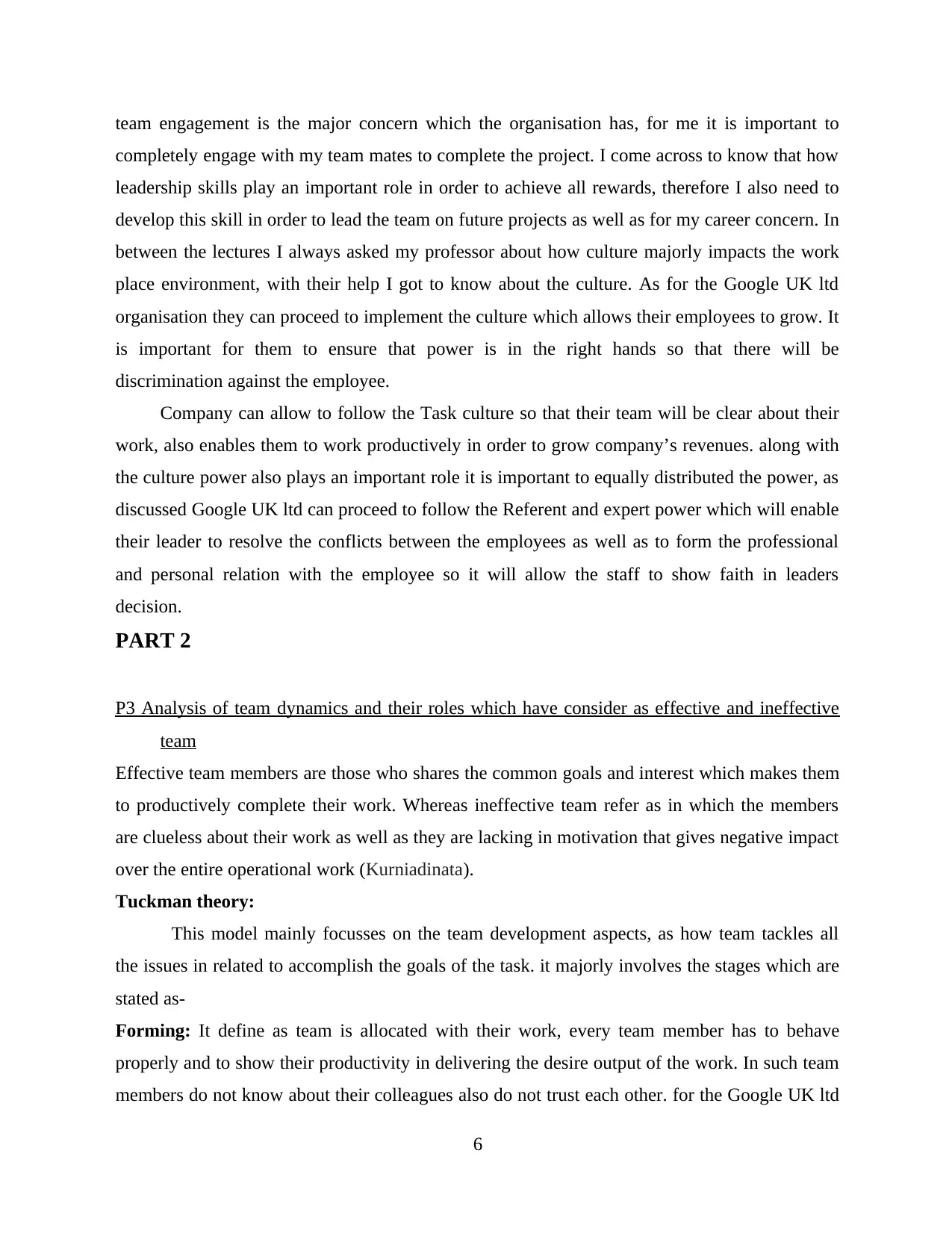
team engagement is the major concern which the organisation has, for me it is important to
completely engage with my team mates to complete the project. I come across to know that how
leadership skills play an important role in order to achieve all rewards, therefore I also need to
develop this skill in order to lead the team on future projects as well as for my career concern. In
between the lectures I always asked my professor about how culture majorly impacts the work
place environment, with their help I got to know about the culture. As for the Google UK ltd
organisation they can proceed to implement the culture which allows their employees to grow. It
is important for them to ensure that power is in the right hands so that there will be
discrimination against the employee.
Company can allow to follow the Task culture so that their team will be clear about their
work, also enables them to work productively in order to grow company’s revenues. along with
the culture power also plays an important role it is important to equally distributed the power, as
discussed Google UK ltd can proceed to follow the Referent and expert power which will enable
their leader to resolve the conflicts between the employees as well as to form the professional
and personal relation with the employee so it will allow the staff to show faith in leaders
decision.
PART 2
P3 Analysis of team dynamics and their roles which have consider as effective and ineffective
team
Effective team members are those who shares the common goals and interest which makes them
to productively complete their work. Whereas ineffective team refer as in which the members
are clueless about their work as well as they are lacking in motivation that gives negative impact
over the entire operational work (Kurniadinata).
Tuckman theory:
This model mainly focusses on the team development aspects, as how team tackles all
the issues in related to accomplish the goals of the task. it majorly involves the stages which are
stated as-
Forming: It define as team is allocated with their work, every team member has to behave
properly and to show their productivity in delivering the desire output of the work. In such team
members do not know about their colleagues also do not trust each other. for the Google UK ltd
6
completely engage with my team mates to complete the project. I come across to know that how
leadership skills play an important role in order to achieve all rewards, therefore I also need to
develop this skill in order to lead the team on future projects as well as for my career concern. In
between the lectures I always asked my professor about how culture majorly impacts the work
place environment, with their help I got to know about the culture. As for the Google UK ltd
organisation they can proceed to implement the culture which allows their employees to grow. It
is important for them to ensure that power is in the right hands so that there will be
discrimination against the employee.
Company can allow to follow the Task culture so that their team will be clear about their
work, also enables them to work productively in order to grow company’s revenues. along with
the culture power also plays an important role it is important to equally distributed the power, as
discussed Google UK ltd can proceed to follow the Referent and expert power which will enable
their leader to resolve the conflicts between the employees as well as to form the professional
and personal relation with the employee so it will allow the staff to show faith in leaders
decision.
PART 2
P3 Analysis of team dynamics and their roles which have consider as effective and ineffective
team
Effective team members are those who shares the common goals and interest which makes them
to productively complete their work. Whereas ineffective team refer as in which the members
are clueless about their work as well as they are lacking in motivation that gives negative impact
over the entire operational work (Kurniadinata).
Tuckman theory:
This model mainly focusses on the team development aspects, as how team tackles all
the issues in related to accomplish the goals of the task. it majorly involves the stages which are
stated as-
Forming: It define as team is allocated with their work, every team member has to behave
properly and to show their productivity in delivering the desire output of the work. In such team
members do not know about their colleagues also do not trust each other. for the Google UK ltd
6
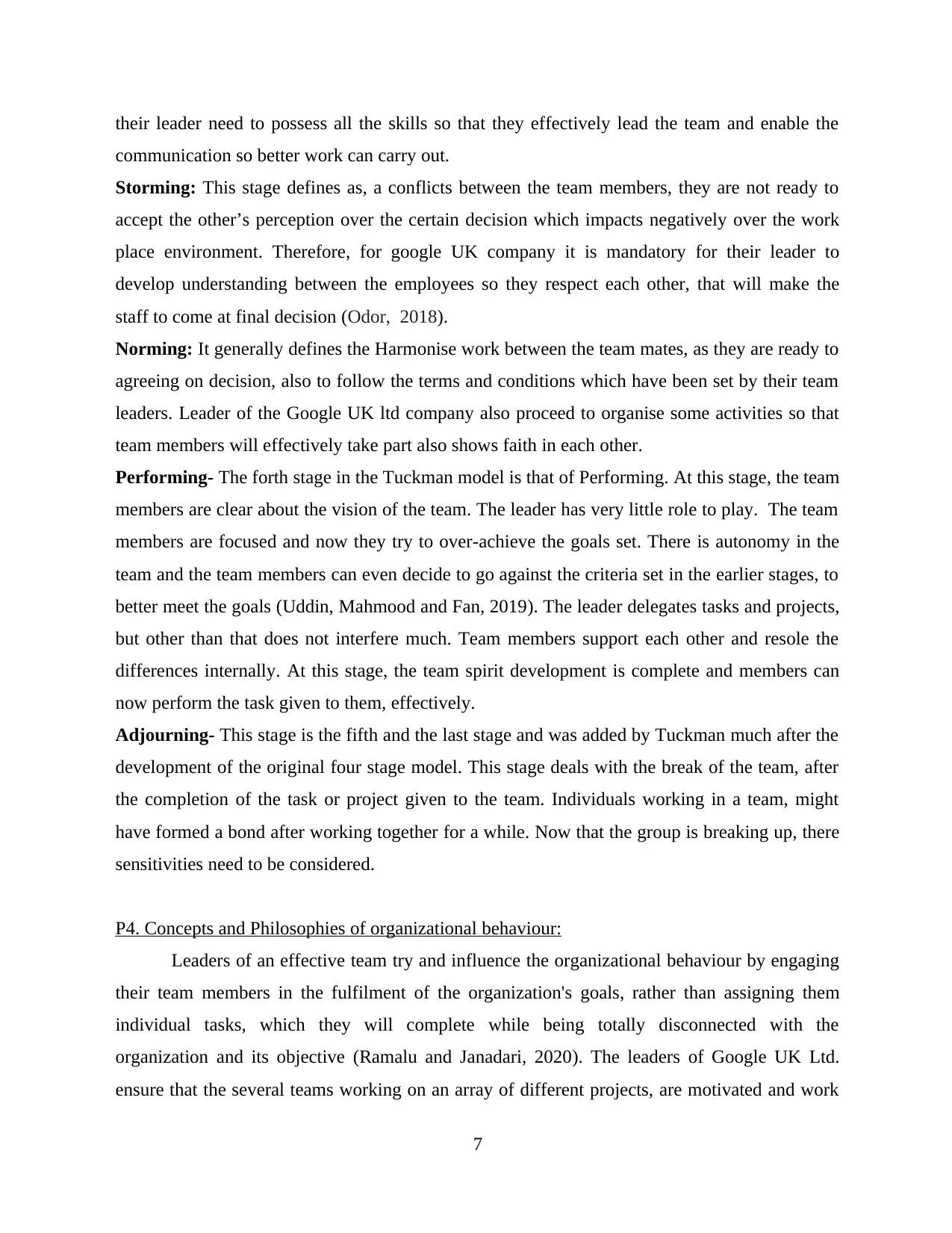
their leader need to possess all the skills so that they effectively lead the team and enable the
communication so better work can carry out.
Storming: This stage defines as, a conflicts between the team members, they are not ready to
accept the other’s perception over the certain decision which impacts negatively over the work
place environment. Therefore, for google UK company it is mandatory for their leader to
develop understanding between the employees so they respect each other, that will make the
staff to come at final decision (Odor, 2018).
Norming: It generally defines the Harmonise work between the team mates, as they are ready to
agreeing on decision, also to follow the terms and conditions which have been set by their team
leaders. Leader of the Google UK ltd company also proceed to organise some activities so that
team members will effectively take part also shows faith in each other.
Performing- The forth stage in the Tuckman model is that of Performing. At this stage, the team
members are clear about the vision of the team. The leader has very little role to play. The team
members are focused and now they try to over-achieve the goals set. There is autonomy in the
team and the team members can even decide to go against the criteria set in the earlier stages, to
better meet the goals (Uddin, Mahmood and Fan, 2019). The leader delegates tasks and projects,
but other than that does not interfere much. Team members support each other and resole the
differences internally. At this stage, the team spirit development is complete and members can
now perform the task given to them, effectively.
Adjourning- This stage is the fifth and the last stage and was added by Tuckman much after the
development of the original four stage model. This stage deals with the break of the team, after
the completion of the task or project given to the team. Individuals working in a team, might
have formed a bond after working together for a while. Now that the group is breaking up, there
sensitivities need to be considered.
P4. Concepts and Philosophies of organizational behaviour:
Leaders of an effective team try and influence the organizational behaviour by engaging
their team members in the fulfilment of the organization's goals, rather than assigning them
individual tasks, which they will complete while being totally disconnected with the
organization and its objective (Ramalu and Janadari, 2020). The leaders of Google UK Ltd.
ensure that the several teams working on an array of different projects, are motivated and work
7
communication so better work can carry out.
Storming: This stage defines as, a conflicts between the team members, they are not ready to
accept the other’s perception over the certain decision which impacts negatively over the work
place environment. Therefore, for google UK company it is mandatory for their leader to
develop understanding between the employees so they respect each other, that will make the
staff to come at final decision (Odor, 2018).
Norming: It generally defines the Harmonise work between the team mates, as they are ready to
agreeing on decision, also to follow the terms and conditions which have been set by their team
leaders. Leader of the Google UK ltd company also proceed to organise some activities so that
team members will effectively take part also shows faith in each other.
Performing- The forth stage in the Tuckman model is that of Performing. At this stage, the team
members are clear about the vision of the team. The leader has very little role to play. The team
members are focused and now they try to over-achieve the goals set. There is autonomy in the
team and the team members can even decide to go against the criteria set in the earlier stages, to
better meet the goals (Uddin, Mahmood and Fan, 2019). The leader delegates tasks and projects,
but other than that does not interfere much. Team members support each other and resole the
differences internally. At this stage, the team spirit development is complete and members can
now perform the task given to them, effectively.
Adjourning- This stage is the fifth and the last stage and was added by Tuckman much after the
development of the original four stage model. This stage deals with the break of the team, after
the completion of the task or project given to the team. Individuals working in a team, might
have formed a bond after working together for a while. Now that the group is breaking up, there
sensitivities need to be considered.
P4. Concepts and Philosophies of organizational behaviour:
Leaders of an effective team try and influence the organizational behaviour by engaging
their team members in the fulfilment of the organization's goals, rather than assigning them
individual tasks, which they will complete while being totally disconnected with the
organization and its objective (Ramalu and Janadari, 2020). The leaders of Google UK Ltd.
ensure that the several teams working on an array of different projects, are motivated and work
7
⊘ This is a preview!⊘
Do you want full access?
Subscribe today to unlock all pages.

Trusted by 1+ million students worldwide
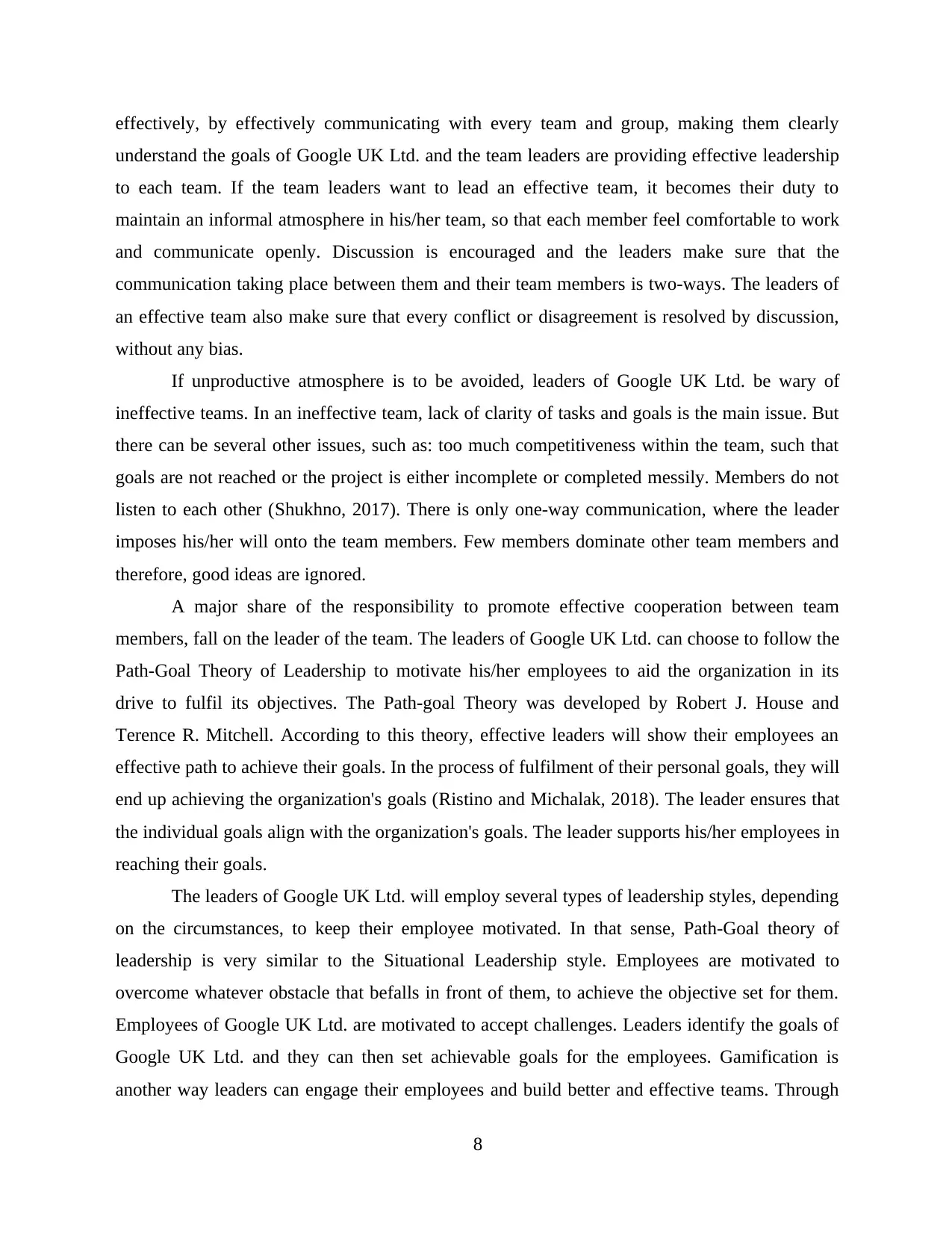
effectively, by effectively communicating with every team and group, making them clearly
understand the goals of Google UK Ltd. and the team leaders are providing effective leadership
to each team. If the team leaders want to lead an effective team, it becomes their duty to
maintain an informal atmosphere in his/her team, so that each member feel comfortable to work
and communicate openly. Discussion is encouraged and the leaders make sure that the
communication taking place between them and their team members is two-ways. The leaders of
an effective team also make sure that every conflict or disagreement is resolved by discussion,
without any bias.
If unproductive atmosphere is to be avoided, leaders of Google UK Ltd. be wary of
ineffective teams. In an ineffective team, lack of clarity of tasks and goals is the main issue. But
there can be several other issues, such as: too much competitiveness within the team, such that
goals are not reached or the project is either incomplete or completed messily. Members do not
listen to each other (Shukhno, 2017). There is only one-way communication, where the leader
imposes his/her will onto the team members. Few members dominate other team members and
therefore, good ideas are ignored.
A major share of the responsibility to promote effective cooperation between team
members, fall on the leader of the team. The leaders of Google UK Ltd. can choose to follow the
Path-Goal Theory of Leadership to motivate his/her employees to aid the organization in its
drive to fulfil its objectives. The Path-goal Theory was developed by Robert J. House and
Terence R. Mitchell. According to this theory, effective leaders will show their employees an
effective path to achieve their goals. In the process of fulfilment of their personal goals, they will
end up achieving the organization's goals (Ristino and Michalak, 2018). The leader ensures that
the individual goals align with the organization's goals. The leader supports his/her employees in
reaching their goals.
The leaders of Google UK Ltd. will employ several types of leadership styles, depending
on the circumstances, to keep their employee motivated. In that sense, Path-Goal theory of
leadership is very similar to the Situational Leadership style. Employees are motivated to
overcome whatever obstacle that befalls in front of them, to achieve the objective set for them.
Employees of Google UK Ltd. are motivated to accept challenges. Leaders identify the goals of
Google UK Ltd. and they can then set achievable goals for the employees. Gamification is
another way leaders can engage their employees and build better and effective teams. Through
8
understand the goals of Google UK Ltd. and the team leaders are providing effective leadership
to each team. If the team leaders want to lead an effective team, it becomes their duty to
maintain an informal atmosphere in his/her team, so that each member feel comfortable to work
and communicate openly. Discussion is encouraged and the leaders make sure that the
communication taking place between them and their team members is two-ways. The leaders of
an effective team also make sure that every conflict or disagreement is resolved by discussion,
without any bias.
If unproductive atmosphere is to be avoided, leaders of Google UK Ltd. be wary of
ineffective teams. In an ineffective team, lack of clarity of tasks and goals is the main issue. But
there can be several other issues, such as: too much competitiveness within the team, such that
goals are not reached or the project is either incomplete or completed messily. Members do not
listen to each other (Shukhno, 2017). There is only one-way communication, where the leader
imposes his/her will onto the team members. Few members dominate other team members and
therefore, good ideas are ignored.
A major share of the responsibility to promote effective cooperation between team
members, fall on the leader of the team. The leaders of Google UK Ltd. can choose to follow the
Path-Goal Theory of Leadership to motivate his/her employees to aid the organization in its
drive to fulfil its objectives. The Path-goal Theory was developed by Robert J. House and
Terence R. Mitchell. According to this theory, effective leaders will show their employees an
effective path to achieve their goals. In the process of fulfilment of their personal goals, they will
end up achieving the organization's goals (Ristino and Michalak, 2018). The leader ensures that
the individual goals align with the organization's goals. The leader supports his/her employees in
reaching their goals.
The leaders of Google UK Ltd. will employ several types of leadership styles, depending
on the circumstances, to keep their employee motivated. In that sense, Path-Goal theory of
leadership is very similar to the Situational Leadership style. Employees are motivated to
overcome whatever obstacle that befalls in front of them, to achieve the objective set for them.
Employees of Google UK Ltd. are motivated to accept challenges. Leaders identify the goals of
Google UK Ltd. and they can then set achievable goals for the employees. Gamification is
another way leaders can engage their employees and build better and effective teams. Through
8
Paraphrase This Document
Need a fresh take? Get an instant paraphrase of this document with our AI Paraphraser
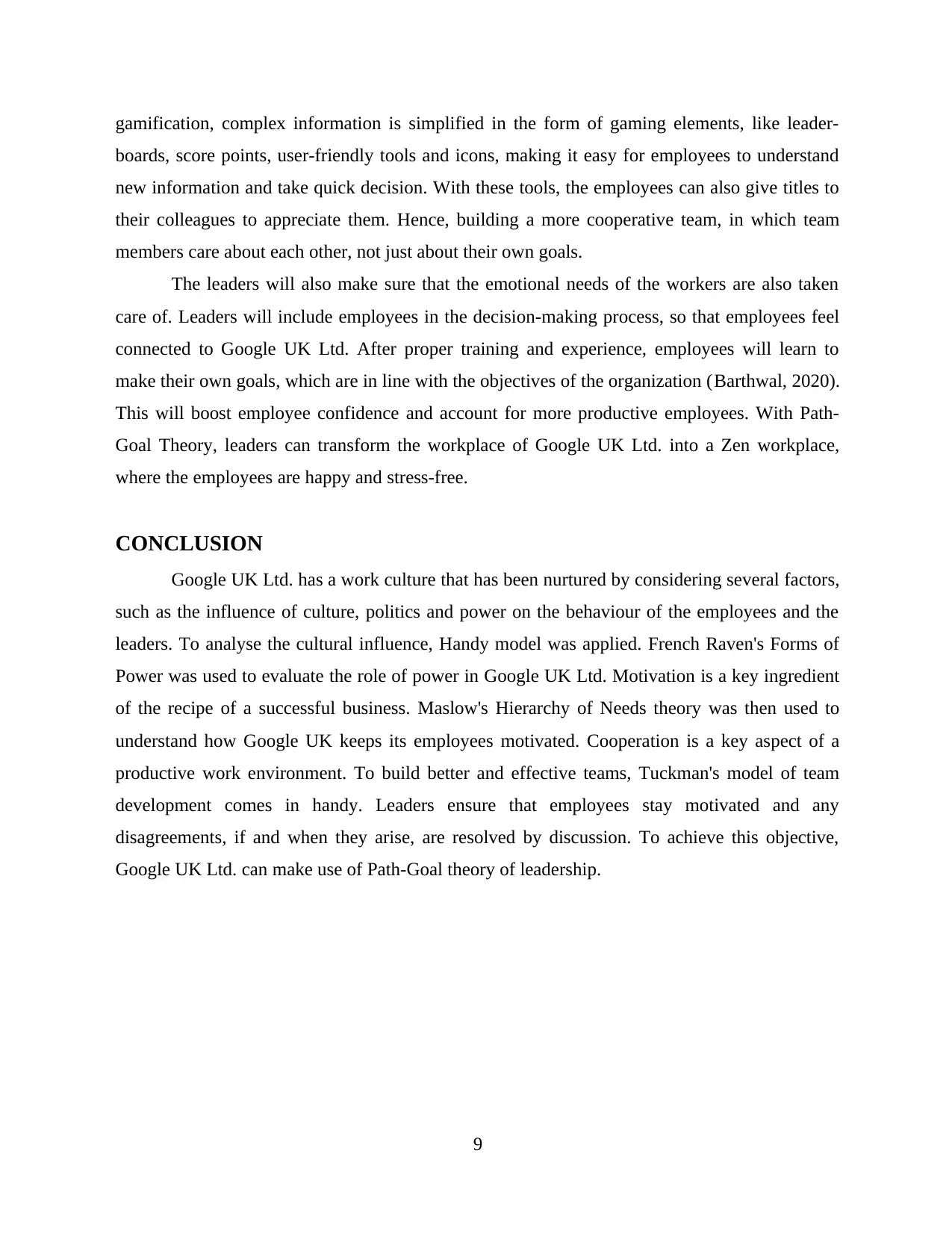
gamification, complex information is simplified in the form of gaming elements, like leader-
boards, score points, user-friendly tools and icons, making it easy for employees to understand
new information and take quick decision. With these tools, the employees can also give titles to
their colleagues to appreciate them. Hence, building a more cooperative team, in which team
members care about each other, not just about their own goals.
The leaders will also make sure that the emotional needs of the workers are also taken
care of. Leaders will include employees in the decision-making process, so that employees feel
connected to Google UK Ltd. After proper training and experience, employees will learn to
make their own goals, which are in line with the objectives of the organization (Barthwal, 2020).
This will boost employee confidence and account for more productive employees. With Path-
Goal Theory, leaders can transform the workplace of Google UK Ltd. into a Zen workplace,
where the employees are happy and stress-free.
CONCLUSION
Google UK Ltd. has a work culture that has been nurtured by considering several factors,
such as the influence of culture, politics and power on the behaviour of the employees and the
leaders. To analyse the cultural influence, Handy model was applied. French Raven's Forms of
Power was used to evaluate the role of power in Google UK Ltd. Motivation is a key ingredient
of the recipe of a successful business. Maslow's Hierarchy of Needs theory was then used to
understand how Google UK keeps its employees motivated. Cooperation is a key aspect of a
productive work environment. To build better and effective teams, Tuckman's model of team
development comes in handy. Leaders ensure that employees stay motivated and any
disagreements, if and when they arise, are resolved by discussion. To achieve this objective,
Google UK Ltd. can make use of Path-Goal theory of leadership.
9
boards, score points, user-friendly tools and icons, making it easy for employees to understand
new information and take quick decision. With these tools, the employees can also give titles to
their colleagues to appreciate them. Hence, building a more cooperative team, in which team
members care about each other, not just about their own goals.
The leaders will also make sure that the emotional needs of the workers are also taken
care of. Leaders will include employees in the decision-making process, so that employees feel
connected to Google UK Ltd. After proper training and experience, employees will learn to
make their own goals, which are in line with the objectives of the organization (Barthwal, 2020).
This will boost employee confidence and account for more productive employees. With Path-
Goal Theory, leaders can transform the workplace of Google UK Ltd. into a Zen workplace,
where the employees are happy and stress-free.
CONCLUSION
Google UK Ltd. has a work culture that has been nurtured by considering several factors,
such as the influence of culture, politics and power on the behaviour of the employees and the
leaders. To analyse the cultural influence, Handy model was applied. French Raven's Forms of
Power was used to evaluate the role of power in Google UK Ltd. Motivation is a key ingredient
of the recipe of a successful business. Maslow's Hierarchy of Needs theory was then used to
understand how Google UK keeps its employees motivated. Cooperation is a key aspect of a
productive work environment. To build better and effective teams, Tuckman's model of team
development comes in handy. Leaders ensure that employees stay motivated and any
disagreements, if and when they arise, are resolved by discussion. To achieve this objective,
Google UK Ltd. can make use of Path-Goal theory of leadership.
9

10
⊘ This is a preview!⊘
Do you want full access?
Subscribe today to unlock all pages.

Trusted by 1+ million students worldwide
1 out of 14
Related Documents
Your All-in-One AI-Powered Toolkit for Academic Success.
+13062052269
info@desklib.com
Available 24*7 on WhatsApp / Email
![[object Object]](/_next/static/media/star-bottom.7253800d.svg)
Unlock your academic potential
Copyright © 2020–2026 A2Z Services. All Rights Reserved. Developed and managed by ZUCOL.



